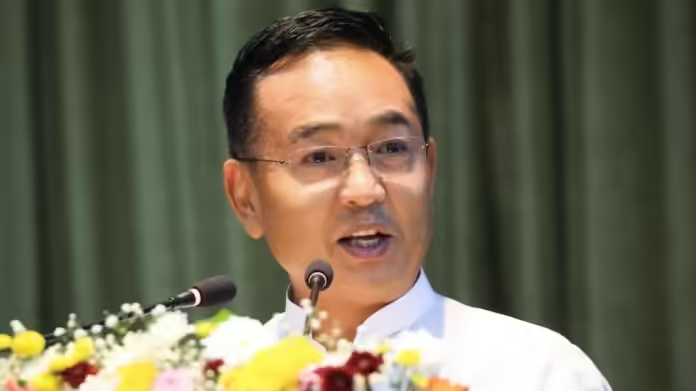Sikkim has joined the growing chorus of support for the ‘One Nation, One Election’ proposal, advocating for the synchronization of elections across India. This initiative seeks to streamline the electoral process by holding simultaneous elections for the Lok Sabha (lower house of Parliament) and state legislative assemblies.
Background of the ‘One Nation, One Election’ Proposal
The ‘One Nation, One Election’ proposal aims to consolidate the electoral process by aligning the timing of national and state elections. Key aspects of the proposal include:
- Unified Electoral Cycle: The proposal suggests conducting Lok Sabha and state legislative assembly elections simultaneously, rather than holding them at different times. This would create a unified electoral cycle for the entire country.
- Objective: The primary objective is to reduce the frequency of elections, minimize disruptions to governance, and streamline administrative processes. By aligning elections, the proposal aims to enhance efficiency and stability in the electoral system.
- Implementation: Implementing the proposal would require constitutional amendments and legislative changes. It involves coordinating with various political parties, state governments, and electoral authorities to ensure a smooth transition.
Sikkim’s Support for the Proposal
Sikkim’s backing of the ‘One Nation, One Election’ proposal reflects the state’s commitment to electoral reforms and efficient governance. Key points regarding Sikkim’s support include:
- State Government Endorsement: The Sikkim state government has expressed its support for the proposal, emphasizing the benefits of a synchronized electoral process. The endorsement aligns with the broader objective of improving administrative efficiency and reducing electoral fatigue.
- Political Consensus: Sikkim’s support indicates a degree of political consensus within the state regarding the need for electoral reforms. The endorsement reflects a recognition of the potential advantages of having a single election cycle for national and state elections.
- Alignment with National Goals: By backing the proposal, Sikkim aligns itself with the national objective of streamlining the electoral process. The state’s support is seen as a step towards achieving a more efficient and cohesive electoral framework.
Benefits of ‘One Nation, One Election’
The ‘One Nation, One Election’ proposal offers several potential benefits:
- Reduced Election Frequency: Holding simultaneous elections would reduce the frequency of electoral events, minimizing disruptions to governance and administrative operations. This would allow for a more stable and continuous functioning of the government.
- Cost Savings: Consolidating elections would lead to significant cost savings by reducing the expenses associated with organizing and conducting separate elections. This includes savings on logistics, security, and administrative costs.
- Enhanced Governance: A unified electoral cycle would enable governments to focus on governance and policy implementation without the frequent interruptions of election campaigns. This could lead to more effective and consistent policy execution.
- Voter Convenience: Simultaneous elections would provide voters with a single opportunity to participate in both national and state elections. This could enhance voter engagement and reduce the likelihood of voter fatigue.
- Improved Administrative Efficiency: Streamlining the electoral process would simplify administrative procedures, leading to more efficient management of elections and related activities. This could enhance the overall electoral experience for both voters and candidates.
While the proposal offers several benefits, there are also challenges and considerations:
- Constitutional Amendments: Implementing ‘One Nation, One Election’ would require amendments to the Constitution and changes to existing electoral laws. This involves complex legal and legislative processes.
- Political Consensus: Achieving consensus among various political parties and state governments is crucial for the successful implementation of the proposal. Negotiating and addressing differing viewpoints will be essential.
- Administrative Readiness: The transition to a unified electoral cycle would require careful planning and coordination among electoral authorities. Ensuring administrative readiness and managing logistical challenges will be key to a smooth implementation.
- Impact on State Autonomy: There are concerns about how simultaneous elections might affect the autonomy of state governments and their ability to address regional issues. Balancing national and state interests will be important.
The adoption of ‘One Nation, One Election’ has broader implications for Indian politics and governance:
- Strengthening Democratic Processes: By reducing electoral disruptions and enhancing administrative efficiency, the proposal could contribute to strengthening democratic processes and ensuring a more stable governance environment.
- Encouraging Electoral Reforms: The proposal highlights the need for broader electoral reforms and modernization of the electoral system. It may prompt discussions and initiatives to address other aspects of electoral and political processes.
- Impact on Political Strategies: Simultaneous elections would require political parties to adjust their strategies and campaigns to align with the unified electoral cycle. This could influence campaign dynamics and political alliances.
- Public Perception: The success of the proposal will depend on public perception and acceptance. Clear communication and addressing concerns about the impact on state autonomy and regional issues will be crucial.
Sikkim’s endorsement of the ‘One Nation, One Election’ proposal underscores the state’s commitment to electoral reform and efficient governance. The proposal, aimed at synchronizing national and state elections, promises to offer major benefits, including reduced election frequency, cost savings, and enhanced governance.




